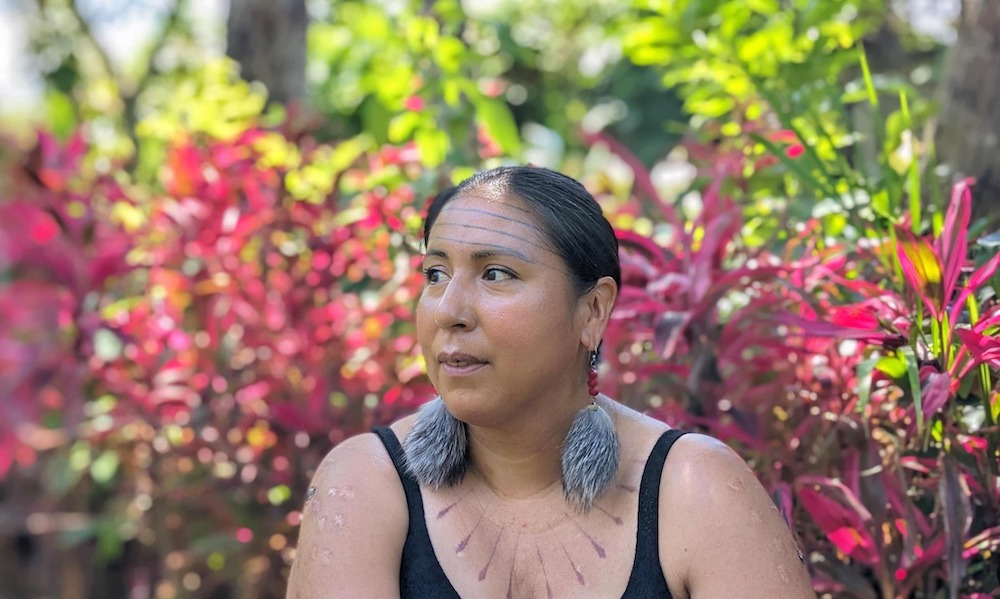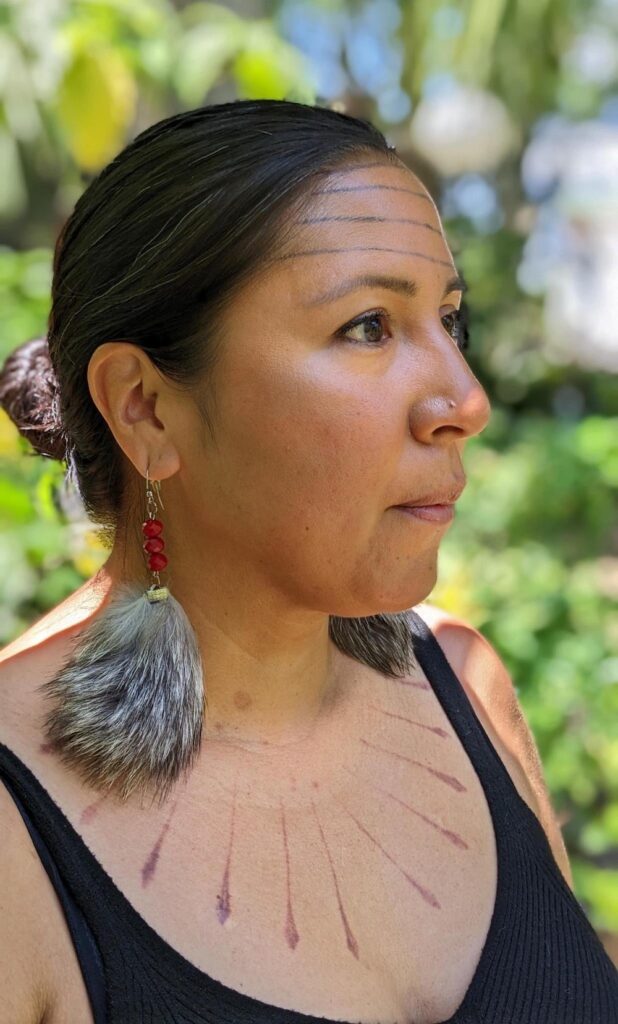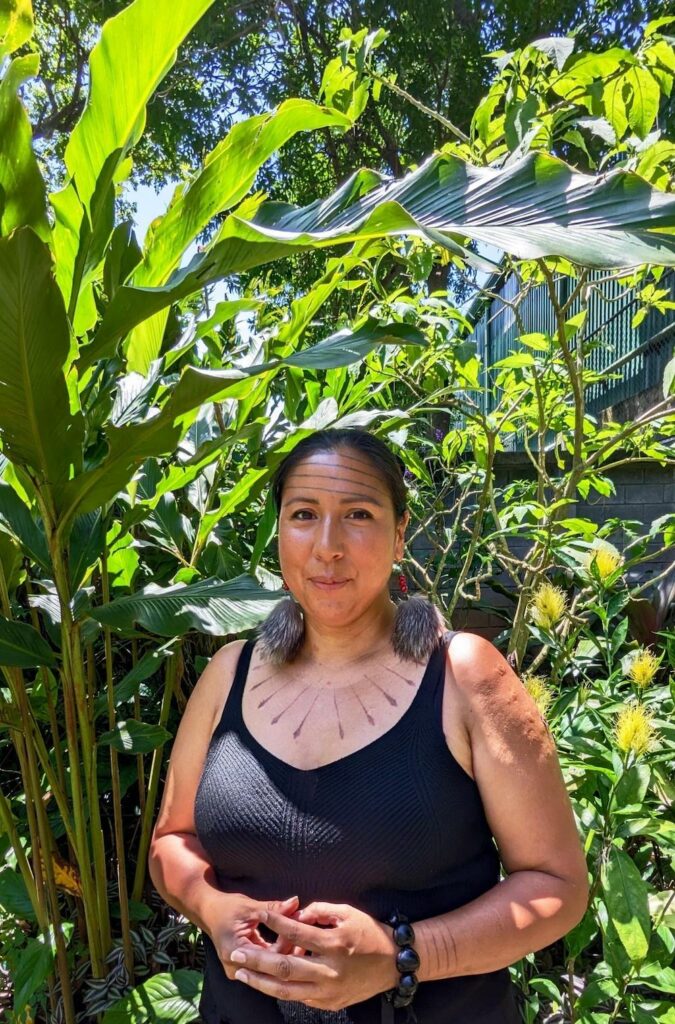How can we build new worlds, and find the sweet spots for innovation? In this interview, we speak with consultant Heather Milton-Lightening about her organization, just transition work, and how innovation can help us create the futures we want even ‘when the sky is falling’.

Over the last three days, you have brought up the ‘just transition’ in several conversations. What does a ‘just transition’ mean to you?
On a personal level, when thinking about a ‘just transition’, I ask myself: How can I make a deep change to capitalism in the territory that I come from? We’ve had 150 years of residential school systems that have beaten capitalist ideals into our heads. We were told to sign pipeline deals, go after the coal, lease our lands. Resource extraction is seen as poverty alleviation.
When people came to our territories, our understanding was that these people would live by our laws. And had they done that, maybe there would still be clean water. Right now, out of the whole territory, there are maybe two lakes you can actually drink from – it’s shameful that this is what happened in 150 years. So the impacts are deep, and undoing them is going to be challenging.
That’s why I think we need to change the way capitalism functions nowadays, to get us off this idea of endless growth and market-based solutions. To me, ‘just transition’ is a way out of capitalism. The reason I keep talking about it is because I think that one of the roots of colonialism is capitalism. The striving for resources, land, and water is the origin of both. That’s why ‘just transition’ also means decolonization to me.
You are planning to work on a new organization. Can you tell us a bit more about it?
One of the projects I’m hoping to work on in the next six months is building a new organization in Canada called the Just Transition Institute. The point of the institute is to support communities to become self-determining, independent and sovereign from outside entities.
For example, it is still difficult in Canada to get charitable status as an organization. With the Just Transition Institute, we hope to become a fiscal sponsor for communities. In the longer term, we hope that the institute creates a network and inventory of projects that fall under the idea of ‘just transition’. We want to start connecting people in communities so that they can replicate projects and learn from each other. In the very long term, the hope is to develop a funding pool so that we can fund projects directly rather than being an intermediary.
I have these big dreams and I ask myself: Where are the places and what are the needs in our communities? What does not yet exist? How can we bring people together to build amazing things? This is also the reason why I’ve been so excited about this gathering.
What exactly is it that makes you so excited?
Often I exist in these climate justice spaces and they’re so heavy. The sky is falling, the world’s ending. And I’m saying to myself that we’ve been through so many cataclysmic events, and yet we are still here. So there must be a place where hope exists. To me, that’s where the idea of creative innovation comes in – innovation to get us out of capitalism and colonialism, and to survive what is ahead.
At least from my perspective, we have spent more energy on taking things down; we haven’t given enough value to creative spaces. As much as we’re fighting and carrying out actions and shutting things down, we still have to create the world that we want to see in tandem, at the same time.
This is the real reason why I’ve been so excited about this gathering: to see innovation in the digital sphere in a way that’s just for our people, and that upholds traditional ecological knowledge. I’m not saying that we should go back a thousand years. I’m saying that we should look for the sweet spots of innovation, so that we can adapt in a real way. We need an approach that’s equitable, that’s just, and really does see our people lead in our own territories. I think that could be revolutionary.


Where is it possible to find this visionary space for people to create the world we want to see?
I really appreciate work around futurism and the idea of science fiction meeting reality, because we should spend more time thinking about what the future looks like instead of the ‘we’re all gonna die’ narratives.
Unfortunately, this has been challenging for our communities. Some are still in survival mode, some are ready to thrive, some not quite yet. And when you’re trying to survive, you don’t have a moment to actually sit back and imagine, right? You don’t have the time to have visions, to have dreams, to have the privilege of just being able to sit still and imagine.
For me, that’s one of the biggest missing pieces in a lot of the work that we do. Just being able to provide that visionary space and really uphold the people who are doing visionary work. For me, a lot of these people are artists. They’re writers, they’re singers, they’re poets. They are the people who are actually, honestly, leading innovation in our communities right now. The people who are doing this visionary work are the ones who are building the world we want to see. That’s what makes me so excited about the future.
Thank you so much, Heather.
Katrin Fritsch researches, writes and consults at the intersection of climate justice, digital rights, and feminism. She advises organisations on data, justice, and emerging technologies. Currently, she is a senior program manager at Green Web Foundation, and the chair of epicenter.works. Previously, she co-founded and co-led MOTIF, a think tank working towards social justice in the digital age. Katrin is the co-initiator of Feminist Futures, and holds an MSc in Data & Society from London School of Economics and Political Science.
Heather Milton-Lightening has over twenty years of organizing experience from local issues to international campaigns. She was a founding member of Native Youth Movement, and also built a national Native youth network that supported Native youth organizing across the US and Canada with the Indigenous Environmental Network. She was a former member of the United Nations Environment Programme’s Youth Advisory and has extensive experience in lobbying internationally through the United Nations and other international arenas on Indigenous Peoples’ issues. She was formerly the Director & Co-Director of the Canadian Indigenous Tar Sands Campaign, and is currently consulting different organizations doing training, facilitating and supporting work for Indigenous communities while working on finishing a Masters Degree at York University in Toronto, on Indigenous Just Transition. You can find her on LinkedIn, Facebook, Twitter, and her Blog.

